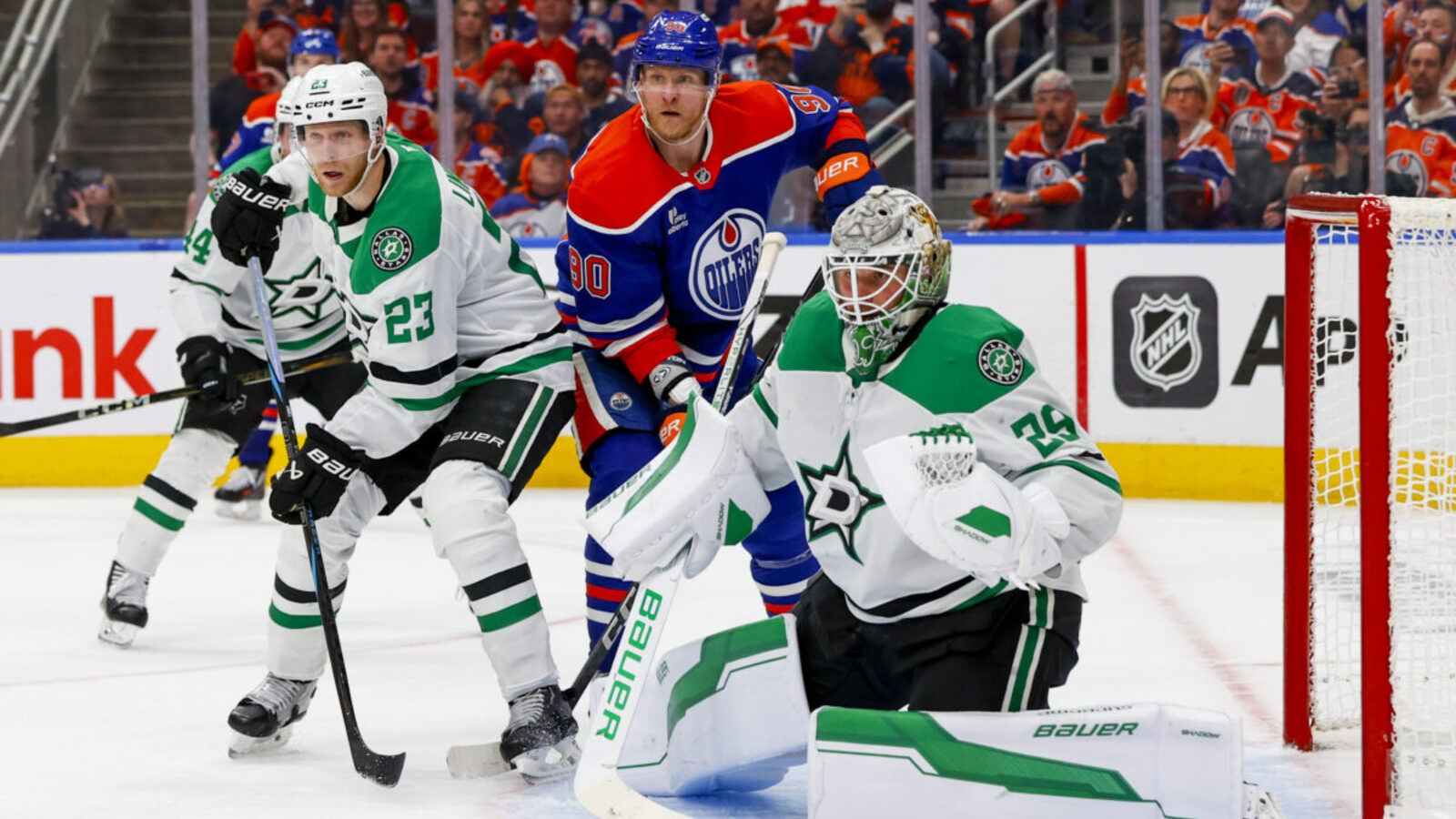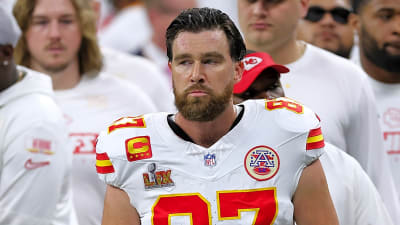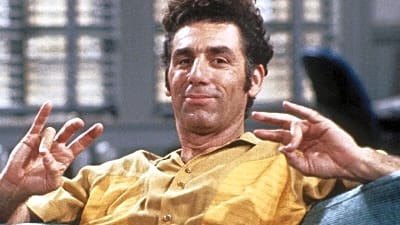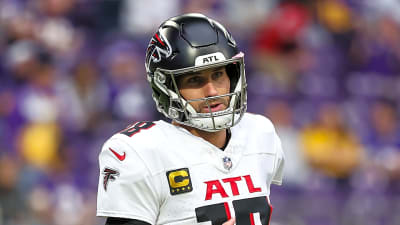
Less than eight minutes into the Dallas Stars‘ do-or-die Game 5 matchup with the Edmonton Oilers, starting goaltender Jake Oettinger was yanked from the crease. With head coach Pete DeBoer‘s team on the brink of elimination, he sought a change—allowing two goals on two shots wasn’t cutting it for him.
You could say the decision itself backfired. Jeff Skinner scored less than a minute after Oettinger’s departure en route to a 6–3 victory. But it’s DeBoer’s postgame press conference that was truly jarring.
Courtesy of The Athletic‘s Mark Lazerus, DeBoer said about his goaltender, “I didn’t blame it all on Jake, but the reality is if you go back to last year’s playoffs, he’s lost six of [his last] seven games to Edmonton. And we give up two goals on two shots in an elimination game. […] That’s a pretty big sample size.”
DeBoer: "I didn't blame it all on Jake, but the reality is if you go back to last year's playoffs, he's lost six of seven games to Edmonton. And we give up two goals on two shots in an elimination game. … That's a pretty big sample size."
— Mark Lazerus (@MarkLazerus) May 30, 2025
Throwing Oettinger under the bus like this could be quite problematic, all things considered. He won’t be a free agent until the summer of 2033 and carries an annual cap hit of $8.25 million—this is a very important player.
Was DeBoer’s outburst meant to justify pulling his franchise goaltender, and nothing else? Or, does it reveal waning confidence in the man between the pipes? Ultimately, he’s wrong either way—the comments were off-base.
How Do Goalies Perform Against the Oilers in the Playoffs?
Since DeBoer referred back to the 2024 Playoffs, let’s look at how all goalies have performed against Edmonton in that time frame. Is perceived poor play an Oettinger-exclusive issue, or something that applies to everyone?
There have been six netminders with at least three starts against the Oilers in the last two playoff campaigns. Here are their numbers, with “goals saved above expected” courtesy of Evolving-Hockey:
| Goalie | Goals Saved Above Expected | Save Percentage |
| Darcy Kuemper | 1.27 | .889 |
| Jake Oettinger | 0.63 | .881 |
| Adin Hill | 0.26 | .893 |
| Sergei Bobrovsky | 0.11 | .899 |
| Arturs Silovs | Minus-2.48 | .882 |
| Cam Talbot | Minus-3.08 | .861 |
DeBoer talked about Oettinger’s unfortunate start to Game 5 as the breaking point. In reality, it took him from first to second place in goals saved above expected. It’s not a be-all, end-all measurement for goalie performance, but it gives a good idea. If there was anyone to scapegoat for the Stars’ third straight defeat in the Western Conference Final, look to the defense. Oettinger did his part.
Oettinger Has Been the Solution, Not the Problem
Despite what their win-loss record will tell you, the Stars weren’t playing great hockey following Miro Heiskanen’s regular season-ending knee injury on Jan. 28. Based on both the eye and stats test, the team oftentimes struggled to exit their zone. Elite finishing and goaltending hid concerning underlying numbers.

Over their next 27 games following the Heiskanen injury, Dallas was dead last in expected goals against. However, they were 10th in actual goals against, made possible by the league’s second-best save percentage during those 27 games. The best shooting percentage, too, allowed them to go 18–5–4.
Included in that span, however, was a two-game losing streak in Games 26 and 27. That spiraled into a seven-game losing streak to end the season. An unsustainable shooting percentage and magnificent goaltending from both Oettinger and backup Casey DeSmith were no longer hiding the truth. That trend continued against the Oilers.
Where Blame for Stars’ Loss Really Belongs
First, let’s talk about the Stars’ right-shot defensemen. A core of Cody Ceci, Ilya Lyubushkin, Matt Dumba, and Alex Petrovic is certainly not Stanley Cup-caliber on paper. It wasn’t on the ice, either—the team got out-chanced substantially when all but Petrovic came over the boards. The first three cost a combined $10.25 million on the cap, yet contributed more to Dallas’ downfall than their success.
Despite signing a two-year, $7.5 million contract in the 2024 offseason, Dumba was a healthy scratch throughout the playoffs. Lyubushkin and Ceci, acquired in the same offseason and subsequent trade deadline, got to play, but the Stars were better off when they didn’t.
| Stat; Playoffs, 5-on-5 | Ceci, Lyubushkin On-Ice | Ceci, Lyubushkin Off-Ice |
| Goal Share | 36.84% | 50.00% |
| Expected Goal Share | 44.70% | 59.69% |
| Ice Time | 521:08 | 366:25 |
These same underlyings existed in the regular season, except the team’s actual goals share was very good. Finishing and goaltending returned to more reasonable levels in the postseason, so the team sank.
It’s not like these results were unpredictable, either. Ceci, Lyubushkin, and Dumba were questionable acquisitions at the time, and they remain that today. Defensemen don’t just defend—they must get out of the zone, but also move the puck up the ice to create offense. Oftentimes, these three did neither. Surviving was the name of the game.
But if the Stars’ defense was such a liability, how did they make the Western Conference Final to begin with? That’s where we get into their broader team philosophy.
Dallas wins in the playoffs through structure and, when that fails, star players breaking out. In 2024, the team was a well-oiled machine against the Vegas Golden Knights and Colorado Avalanche in the first two rounds. But the Oilers were just too dynamic to overcome—structure faltered, and nobody had a breakout series. Meanwhile, Connor McDavid had 10 points in six games.
In 2025, Mikko Rantanen’s 11 points between Games 5 and 7 against the Avalanche buoyed the Stars to the second round. Structure failed at times, partially due to a weaker defense, but their newly added superstar had the stretch of his life. The Winnipeg Jets had their own structural issues in Round 2, while the Stars were more balanced, so the latter advanced. The Oilers posed the same challenge as 2024—Edmonton’s superstars blossomed, leading to Dallas’ structure falling apart disastrously.
The Stars’ playoff elimination was somewhat inevitable. With a flawed roster, they were more or less depending on continued Rantanen-type explosions to have any chance. That’s not Oettinger’s fault—criticizing him is redirecting blame from where it really belongs: the team’s construction.
This doesn’t mean that Dallas’ foundation cannot win a Stanley Cup. Rather, they must be more savvy in their additions. Their core, which includes Oettinger, is very good—they must be smarter in building around it. Changes will be needed in the summer.
Stats courtesy of Natural Stat Trick, unless specified otherwise
More must-reads:
- Stanley Cup Final Game 5 takeaways: Panthers one win away from history
- Dodgers manager offers major update on Shohei Ohtani
- The '50-goal NHL seasons since 2000-01' quiz
Breaking News
Trending News
Customize Your Newsletter
 +
+
Get the latest news and rumors, customized to your favorite sports and teams. Emailed daily. Always free!







